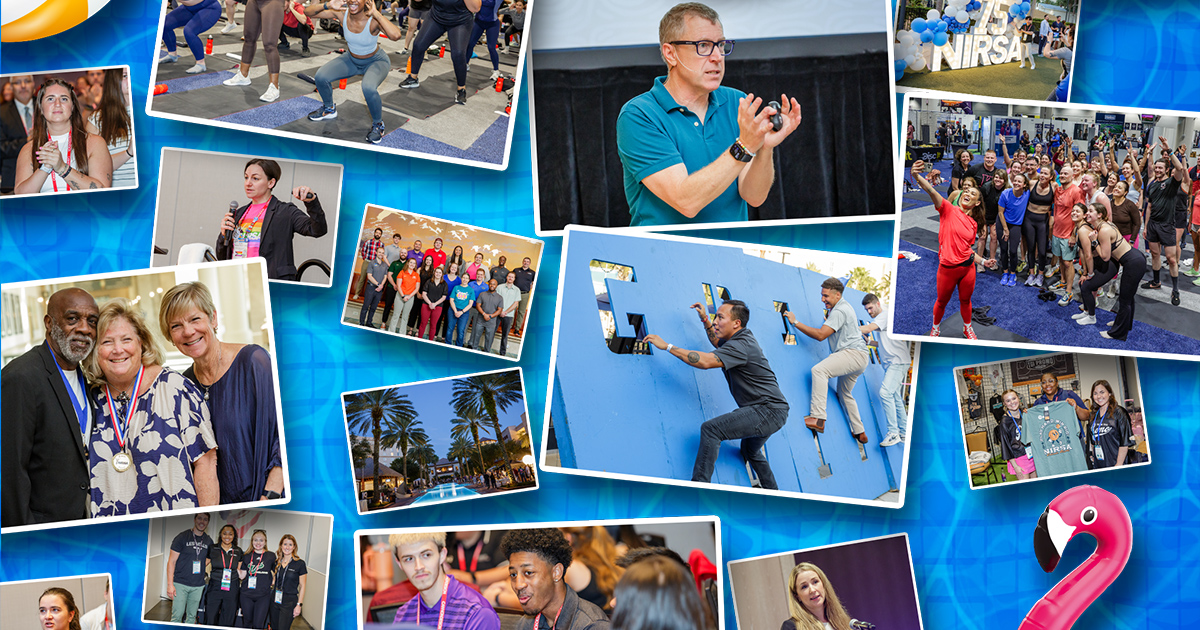With more than 100 sessions to choose from, it’s impossible to attend everything at the NIRSA Annual Conference that might benefit your career. We hope to use this series to preview some of the innovative sessions from the upcoming 2020 NIRSA Annual Conference in Phoenix.
This week we caught up with lead presenter Dr. Julia Buchanan, Assistant Professor and Program Chair in the Health Promotion & Education program at the University of Cincinnati, and co-presenters Shannon Dupree, DHSc, Director of Wellness at NC State University Recreation and Wellness and Courtney Hoffman, MS Wellness Coordinator at University of Kentucky Campus Recreation and Wellness to find out a little bit more about their presentation “A Whole-Person Wellness Approach: Strategies for Creatively Implementing Health Coaching on Campus,” which will explore recent trends of increased health and wellness coaching on college campuses across North America.
Session attendees will have an opportunity to explore various strategies for training and developing a health coaching staff and spend time examining a variety of ways to infuse health coaching principles across your campus environments through collaboration and creativity. Take a few minutes today to discover why health coaching is so important and get good tips on where you can go to learn more.
The importance of health coaching for campus rec
Q: From your perspective, why is health coaching so important for campus recreation professionals?
A: Health coaching allows clients to take control of their habitual thinking, solidify healthy behaviors, and thrive in the classroom and in their everyday lives. At its core, the field of campus recreation serves to support students’ learning and foster lifelong habits of wellbeing. These aims are strongly aided by the integration of health coaching, which can be formally implemented through one-on-one or group sessions, or informally as an embedded component of existing services (e.g., personal training, group fitness).
We know the college years are a period of radical transition stemming from newfound independence, shifting responsibilities, and dynamic schedules. This can often lead to many impediments to student success including stress, less optimal nutrition habits, and reduced levels of physical activity, just to name a few. Health coaches have an ability to serve in a client-centric role which drives individuals toward increased self-efficacy and accountability through setting goals, changing mindsets, addressing barriers, and emphasizing a holistic approach. The essence of health coaching is to shift the culture of health and wellness from dependency to empowerment in the pursuit of making sustainable, healthy behavior change in any area of life.
Key ideas for NIRSA 2020 attendees
Q: What do you hope is the most important takeaway for attendees of your session?
A: Although the field of health coaching has been around for more than 30 years, it is still a relatively new concept when it comes to its application within the campus recreation setting. The beautiful thing is that there is no one-size-fits-all approach to training coaches or implementing health coach programming. There are a wide variety of options when it comes to implementing health coaching, ranging from formal to informal. We want attendees to be aware of the most important considerations when determining what makes sense for their individual campus. We will provide a variety of ways health coach training and programming has been implemented at different colleges and universities, as well as what can be learned from its integration in community health and wellness settings. We hope attendees will walk away feeling connected with strategies that they can adopt or adapt within their home campuses.
Learn more
Q: Where would you direct a reader who wanted to learn more about this topic?
A: In 2017, the field of health coaching reached an exciting milestone with the creation of national health and wellness coaching standards and a national board certification. The National Board for Health and Wellness Coaching is a great place to learn more about the field, find reputable training programs, and resources.
Some books we love related to the health coaching practice include: Coaching Psychology Manual by Margaret Moore and Wellness Coaching for Lasting Lifestyle Change by Michael Arloski, PhD. The Wellcoaches website has several coach resources and research articles. For some easy, fun, (and evidence-based!) reads on behavior change strategies and psychology, we recommend Tiny Habits by B.J. Fogg, PhD and Willpower Instinct by Kelly McGonigal, PhD.
For those interested in the wide body of research related to health coaching, check out the Compendium of Health and Wellness Coaching.
NIRSA would like to thank Julia, Shannon, and Courtney for taking some time to preview their upcoming presentation. Don’t miss your opportunity to discover innovative ideas you can take back to your institution when you spend four days in sunny Phoenix this April at inspiring educational sessions, interactive roundtables, and informative exhibits at the 2020 NIRSA Annual Conference & Campus Rec and Wellness Expo.
Presenter Bios
Julia Buchanan, PhD is currently an Assistant Professor and Program Chair in the Health Promotion & Education program at the University of Cincinnati. Prior to her role at UC, she held various titles in fitness and wellness programming with several university recreation departments. In addition to being a National Board Certified Health & Wellness Coach, she is a Certified Health Education Specialist, Certified Exercise Physiologist, and also holds the Exercise is Medicine Level II credential. Julia has been training aspiring health and wellness coaches for over six years.
Shannon Dupree, DHSc, serves as the Director of Wellness at North Carolina State University at Raleigh Recreation and Wellness. At NC State, she provides strategic leadership for an innovative, integrated, and collaborative wellness model for the campus community. Shannon’s career has also included leading health and wellness programs at North Carolina Central University, Greene County Health Department, and the NC Department of Health and Human Services. She is a Certified Health Education Specialist, a Certified Wellness Practitioner, and Certified Wellness Coach through Wellcoaches.
Courtney Hoffman, MS serves as a Wellness Coordinator within the University of Kentucky Campus Recreation and Wellness Department. She has been within the department for over eight years, and previously held a role as the Membership and Marketing Director. In her current position, she oversees the planning and implementation of several wellness programs on campus, including a collaborative health coaching program. She is the advisor to the Student Wellness Ambassadors and supervises several wellness interns. She is a Certified Health Education Specialist, a Certified Wellness and Health Coach through Real Balance, and is in training to become a KORU mindfulness and meditation instructor.
- For more information about NIRSA 2020, contact Director of Professional Development, Kristen Gleason .
- If you are interested in highlighting your campus or a NIRSA member’s achievements on your campus, pitch us your ideas.







